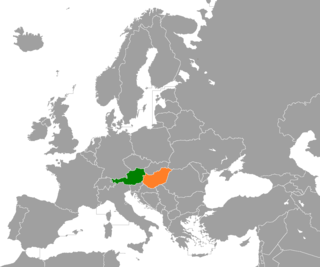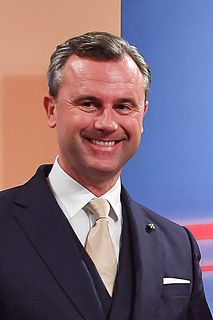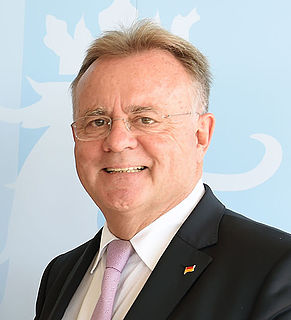
The politics of Austria take place in the framework of the federal parliamentary republic of Austria, with a President as head of state, and a Chancellor as the head of government. Governments, both local and federal, exercise executive power. Federal legislative power is vested both in the Federal Government and in the two chambers of Parliament; the National Council and the Federal Council. The Judiciary of Austria is independent of the executive and the legislature.

The Austrian People's Party is a Christian-democratic and conservative political party in Austria. A successor to the Christian Social Party of the late 19th and early 20th centuries, it was founded immediately following the reestablishment of the Republic of Austria in 1945 and since then has been one of the two largest Austrian political parties with the Social Democratic Party of Austria (SPÖ). In federal governance, the ÖVP has spent most of the postwar era in a grand coalition with the SPÖ. Most recently, it has been junior partner in a coalition government with the SPÖ since 2007. However, the ÖVP won the 2017 election, having the greatest number of seats and formed a coalition with the national-conservative Freedom Party of Austria (FPÖ). Its chairman Sebastian Kurz is the youngest Chancellor in Austrian history.

Styria is a state, or Bundesland, located in the southeast of Austria. In area it is the second largest of the nine Austrian federated states, covering 16,401 km2 (6,332 sq mi). It borders Slovenia and the Austrian states of Upper Austria, Lower Austria, Salzburg, Burgenland, and Carinthia. The capital city is Graz which had 276,526 inhabitants at the beginning of 2015.

The Austrian Landtage are the unicameral legislatures of the nine Austrian states, according to the Constitution of Austria deciding in all matters unless explicitly subject of federal legislation. On federal level the Landtage are represented in the Federal Council.

The Alliance for the Future of Austria is a right-wing populist and national conservative political party in Austria.

The First Austrian Republic was created after the signing of the Treaty of Saint-Germain-en-Laye on 10 September 1919—the settlement after the end of World War I which ended the Habsburg rump state of Republic of German-Austria—and ended with the establishment of the Austrofascist Federal State of Austria based upon a dictatorship of Engelbert Dollfuss and the Fatherland's Front in 1934. The Republic's constitution was enacted in 1 October 1920 and amended on 7 December 1929. The republican period was increasingly marked by violent strife between those with left-wing and right-wing views, leading to the July Revolt of 1927 and the Austrian Civil War of 1934.

The 2006 general election for the National Council in Austria was held on 1 October 2006.

Local and mayoral elections were held in the Austrian state of Burgenland on 7 October 2007. The date was decided on by Franz Steindl (ÖVP), who is responsible for elections as the deputy governor of Burgenland. The elections were held in only 170 of the 171 municipalities of Burgenland because Steinberg-Dörfl had held early elections in 2006.

Austria–Hungary relations are the neighborly relations between Austria and Hungary, two member states of the European Union. Both countries have a long common history since the ruling dynasty of Austria, the Habsburgs, inherited the Hungarian throne in the 16th century. Both were part of the now-defunct Austro-Hungarian Empire from 1867 to 1918. The two countries established diplomatic relations in 1921, after their separation.

The Austrian presidential election took place on 25 April 2010. It was the twelfth election of an Austrian head of state since 1951. The candidates were President Heinz Fischer, Barbara Rosenkranz (FPÖ) and Rudolf Gehring (CPÖ). Heinz Fischer won with just under 80% of the valid votes. The turnout was on the historic low of about 54%.

The Freedom Party of Austria is a right-wing populist and national-conservative political party in Austria. The party, led by Heinz-Christian Strache, is a member of the Europe of Nations and Freedom group in the European Parliament, as well as of the Movement for a Europe of Nations and Freedom.

Norbert Darabos is an Austrian politician and currently secretary general of the Social Democratic Party of Austria (SPÖ). From 2007 to 2013, he served as Minister of National Defence under the chancellors Gusenbauer and Faymann. He is married and has two children.
The List Burgenland is a political party in Austria, operating in the federal state of Burgenland. It was founded in 2010 with support of the Free Citizens' List (FBL).

Legislative elections were held in Austria on 29 September 2013.

The Social Democratic Party of Austria is a social-democratic political party in Austria and alongside with the People's Party one of the country's two traditional major parties.

Norbert Gerwald Hofer is an Austrian politician, a member of the Freedom Party (FPÖ) and since 18 December 2017 the Minister of Transport, Innovation and Technology. He was the Third President of the National Council from 2013 to 2017.

The Burgenland state election of 2015 was held in the Austrian state of Burgenland on 31 May 2015. The major parties both lost votes, with the Social Democratic Party losing 6% of the vote and the Austrian People's Party coming second with 29% of the votes, 5% lower than the last election. Third-parties such as the Freedom Party, the Greens and the regional LBL made gains, all doubling their share of seats in the state parliament.
















